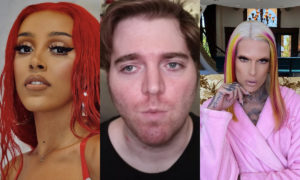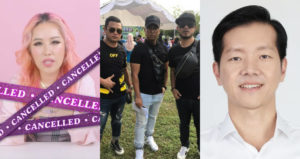The term “cancel culture” has been thrown around a lot in Singapore’s internet-sphere lately, with targets including online provocateur Xiaxue and former political candidate Ivan Lim.
In the brief time since its birth with the #MeToo movement, the social media phenomenon has gone from holding the most powerful accountable to broad application across the realms of culture and politics. But is it leveling the playing field to make the world more just, or, as critics argue, a blunt instrument of mob rule?
The term recently entered the lexicon of Singapore’s culture wars at a time when more voices, especially on the political right, are speaking critically of its alleged threat to expression, with Singaporean influencer Xiaxue joining the likes of Harry Potter author J.K. Rowling in calling for people to reject it.
Coconuts Singapore tracked the evolution of cancel culture and how it has unfolded on our shores.

Empowering the voiceless
Canceling traditionally means discontinuing plans or deleting something. But that definition evolved to also mean ending support for a person and their work after the #MeToo movement emerged three years ago.
Cancel culture, or delegitimizing someone because of their wrongs real or perceived, can be traced to victims of Hollywood sexual predator Harvey Weinstein, whose impunity went unpunished because their voices were not heard.
It wasn’t just a way to impose consequences on someone for their wrongdoing, but also a means to empower those denied power.
Weinstein’s downfall began in 2017, when enduring whispers against the powerful movie producer of Hollywood juggernauts such as Quentin Tarantino’s Kill Bill and the Lord of the Rings came to public attention.
Long ignored by the media, it took multiple victims going on the record with Ronan Farrow in The New Yorker before the criminal charges were filed against then-66 Weinstein in 2018. More than a dozen women had rallied to accuse him of sexual misconduct including rape, which eventually led him to being sentenced to 23 years in prison.
Cancel culture proved liberating for those women and even encouraged other sexual assault victims to speak out. Not long after, a separate group of victims came forward to give voice to long-standing rumors about American comedy giant Bill Cosby, who was later convicted of sexual assault in 2018.

Widespread ‘canceling’
Since then, cancel culture has become more widespread, particularly online and in American pop culture. Celebrities and social media personalities have quickly become targets for “cancellation.” So much so that it seemed increasingly easy for individuals like certain Beauty YouTubers to lose subscribers and fans to cancel culture.
Three noteworthy targets were Say So singer Doja Cat and beauty YouTubers Shane Dawson and Jeffree Star. Hashtags like #DojaCatIsOverParty, #ShaneDawsonIsOverParty and #JeffreeStarIsOverParty even trended on Twitter when the controversies happened.
Not that they came out of nowhere. Fans were reacting unhappily to actions deemed to promote racism, homophobia and even pedophilia. Doja Cat, who is openly bisexual, had apologized for using a homophobic slur in the past and years later apologized again for participating in an alt-right online chatroom but denied participating in racist conversations.
Online stores discontinued products by Dawson and Star after the former drew a backlash for his pedophilia jokes and wearing blackface in his sketches. The latter was caught making racist slurs in previous videos.
How effective those cancel campaigns were remains to be seen. Doja Cat still has her career intact; Star has just announced a new skincare line.
Meanwhile in Singapore, what’s now called cancel culture seems to have been around even before the term was popularized.
Complaining and doxxing, reporting people to the police, and setting up petitions have successfully “cancelled” people in the city-state, some even before the #MeToo movement.
A woman named Amy Cheong fled for Australia after her racist Facebook rant about Malays drew a backlash and police attention.
A petition by a mainly Christian group prompted the authorities to cancel a gig by Swedish black metal band Watain – a move that drew a counter-backlash for happening in a nominally secular nation.
In recent weeks, however, more Singaporeans have used cancel culture to impact individuals in positions of bigger power and influence.
Clicknetwork TV dropped influencer Xiaxue over the “divisive” way she addressed her past racist and xenophobic comments. Ivan Lim withdrew from the ruling political party’s candidate roster after several people accused him of elitist and abusive behavior.
In June, popular entities being held accountable by society was witnessed in the Okletsgo episode after Malay women rallied against the podcast hosts’ misogynistic content. The podcasters rejected complaints until President Halimah Yacob stepped in to demand the trio issue a proper apology and promise to review their content. They quickly did.
Using cancel culture to empower disenfranchised communities seems like a good thing, but some people are increasingly perceiving it as a threat to “unwelcome” opinion, or worse, mob justice.

Canceling cancel culture
In the past month, people resisting cancel culture have come out to criticize it as a form of intolerance and threat to freedom of speech. Because of their efforts to shut it down, the victims inadvertently use the phrase ‘cancel culture’ more often than anyone else.
After British author J.K. Rowling was accused of transphobia earlier this month, she signed an open letter denouncing cancel culture in support of freedom of speech. The letter was also signed by 150 other authors and academics, including novelists Salman Rushdie and Margaret Atwood.
The letter said that it was becoming too common to hear “calls for swift and severe retribution in response to perceived transgressions of speech and thought.” It also condemned the “disproportionate punishments” institutions had meted out to cancel culture targets amid “panicked damaged control.”
Wendy Cheng, aka Xiaxue, also tried to “cancel” cancel culture after being fired by Clicknetwork TV. In a fearmongering video post, the Trump-loving 36 year old told her viewers that the “obsessed” online mob was out to cancel everyone, and that people should start standing up against it.
But regardless of which camp you’re in, it’s pretty clear — at this point at least — that the ones opposed to cancel culture tend to be those held to account in positions of power, influence and privilege. On the flipside, those who support and promote cancel culture usually aren’t.
Other stories you should check out:
Clicknetwork TV drops ‘divisive’ Xiaxue over racist tweets
Okletsgo issues apology after President Halimah Yacob tells them off for ‘misogynistic’ remarks
Bye Ivan, Hello Yao Quan: PAP replaces Jurong GRC candidate after backlash





Reader Interactions